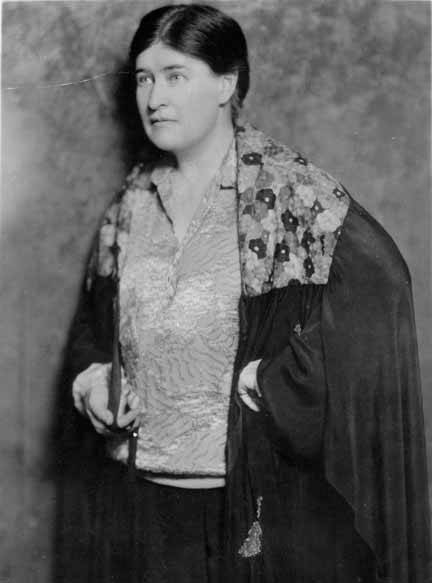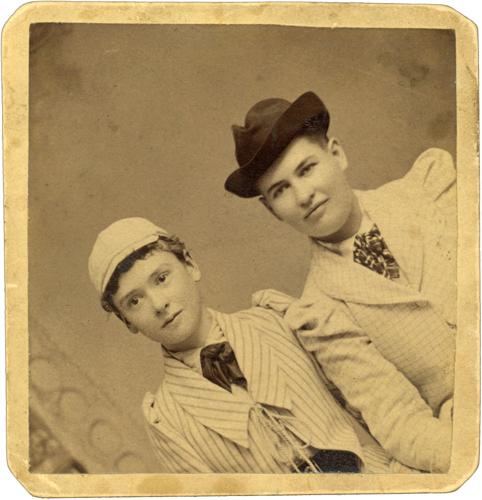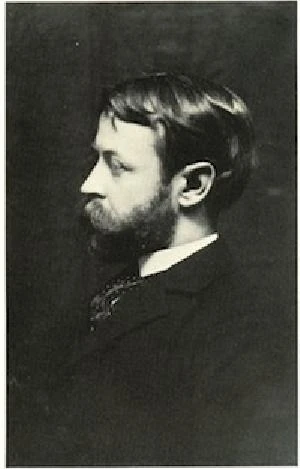
from Bertram Cope's Year
"It's half past ten, but I think I'll run on for a few moments longer. If I don't finish, I can wind up to-morrow.—Mr. Randolph sat opposite me. He looked at me a lot and gave attention to whatever I said—whether said to him, or to my neighbors right and left, or to the whole table. I didn't feel him especially clever, but easy and pleasant—and friendly. Also a little shy—even after we had gone up to the ball-room. I'm afraid that made me more talkative than ever; you know how shyness in another man makes me all the more confident and rackety. Be sure that voice of mine rang out! But not in song. There was a piano up stairs, of course, and that led to a little dancing. Different people took turns in playing. I danced—once—with each of the three girls, and twice with my hostess; then I let Ryder and the two young business-men do the rest. Randolph danced once with Mrs. Phillips, and that ended it for him. My own dancing, as you know, is nothing to brag of: I think the young ladies were quite satisfied with the little I did. I'm sure I was. You also know my views on round dances. Why dancing should be done exclusively by couples arranged strictly on the basis of contrasted sexes…! I think of the good old days of the Renaissance in Italy, when women, if they wanted to dance, just got up and danced—alone, or, if they didn't want to dance alone, danced together. I like to see soldiers or sailors dance in pairs, as a straightforward outlet for superfluous physical energy. Also, peasants in a ring—about a Maypole or something. Also, I very much like square dances and reels. There were enough that night for a quadrille, with somebody for the piano and even somebody to 'call off,'—but whoever sees a quadrille in these days? However, I mustn't burn any more gas on this topic.
*******
"And then he asked me to go into town, one evening soon, and help him spend some. He suggested it rather shyly; à tâtons, I will say—though French is not my business. He offered a dinner at a restaurant, and the theatre afterwards. Did I accept? Indeed I did. Think, Arthur! after all the movies and restaurants round the elms and the fountain (tho' you don't know them yet)! I will say, too, that his cigarettes were rather better than my own….
"I suppose he is fully fifty; but he has his young days, I can see. Certainly his age doesn't obtrude,—doesn't bother me at all, though he sometimes seems conscious of it himself. He wears eye-glasses part of the time,—for dignity, I presume. He
******
Through these many miles Randolph and Cope sat silent: there seemed to be a tacit agreement that they need no longer exert themselves to entertain each other. Cope reached home shortly before midnight. By next morning many of the doings of the previous day had quite passed from his mind. Yet a few firm impressions remained. He had had a good swim, if but a brief one, with a companion who had been willing, even if not bold; he had imposed an acceptable nomenclature upon a somewhat anonymous landscape; and, in circumstances slightly absurd, or at least unfavorable, he had done his voice and his method high credit in song. All else went for next to nothing.
********
He had had, for several days, an understanding with Basil Randolph that they were to go together to the next weekly reception of the president's wife. Randolph wished to push Cope's fortunes wherever he might, and to make him stand out from the general ranks of the young instructors. He had the entrée to the Thursdays at the president's house, and he wanted Cope to meet personally and intimately, under the guidance he could provide, a few of the academic dignitaries and some of the wealthier and more prominent townspeople. Notwithstanding Mrs. Phillips' confident impression, Cope's exploit at her own table had gained no wide currency. The people she had entertained were people who expected and commanded a succession of daily impressions from one quarter or another. With them, a few light words on Cope's achievement were sufficient; they walked straight on toward the sensation the next day was sure to bring. But of course the whole University knew about his second performance. Some of its members had witnessed it, and all of them had read about it, next day, in Churchton's four-page "Index."
********
It turned out to be a young man's night. Mrs. Phillips had invited a few "types" to entertain and instruct her Frenchman. They had come to dinner, and they had stayed on afterward.
Among them was the autumn undergraduate whom Cope, at an earlier day, had disdainfully called "Phaon," a youth of twenty. "You know," said Medora Phillips to Randolph, a few days later, when reviewing the stay of her newest guest, "Those sophisticated, world-worn people so appreciate our fresh, innocent, ingenuous boys. M. Pelouse told me, on leaving, that Roddy quite met his ideal of the young American. So open-faced, so inexperienced, so out of the great world…."
"Good heavens!" said Randolph impatiently. "Do they constitute the world? You might think so,—going about giving us awards, and hanging medals on us, and certifying how well we speak French! Fudge! The world is changing. It would be better," he added, "if more of us—college students included—learned how to speak a decenter English. I went to their dramatic club the other evening. Such pronunciation! Such delivery! I almost longed for the films."
A second "young American" was present—George F. Pearson. Pearson lived with his parents in another big house a block down the street. Mrs. Phillips had summoned him as a type that was purely indigenous—the "young American business man." Pearson had just made a "kill," as he called it—a coup executed quite without the aid of his father, and he was too full of his success to keep still; he was more typical than ever. The Professor had looked at him in staring wonder. So had Amy Leffingwell—in the absence of another target for her large, intent eyes.
********
She turned her stormy face away, and Cope slipped out with a blended sense of mortification, pain and relief.
********
"Well," returned Randolph, in an effortless platitude, "liking is the great mystery—whether you take its coming or its going."
"The sooner this one goes, the better," snapped Foster. "Have you heard from that fellow at all?" he inquired.
"'That fellow'? What fellow—this time?"
"The other one, of course. Cope."
"No."
Foster wiped out Cope with one question.
"Likely to 'cultivate' some other young chap, next year?"
Randolph had a moment of sober thoughtfulness.
"No."
*******
"Nothing better. Something different. Listen, as you yourself say. Next October I shall call on you, put my hand in my inside pocket, bring out a letter and read it to you. It will run like this: 'My dear Mr. Randolph,—You will be pleased, I am sure, to hear that I now have a good position at the university in this pleasant town. Arthur Lemoyne, whom you recall, is studying psychology here, and we are keeping house together. He wishes to be remembered. I thank you for your many kindnesses,'—that is put in as a mere possibility,—'and also send best regards to Mrs. Phillips and the members of her household. Sincerely yours, Bertram L. Cope.'"
********
"I do. Confess that you, with all your outfit and all your goings-on, never quite—never quite—succeeded in…"
Medora shrugged. "The young, at best, only tolerate us. We are but the platform they dance on,—the ladder they climb by."
"After all, he was a 'charming' chap. Your own word, you know."
"Yet scarcely worth the to-do we made over him," said Medora, willing to save her face.
Randolph shrugged in turn, and threw out his hands in a gesture which she had never known him to employ before.
"Worth the to-do? Who is?"
















